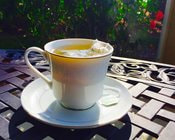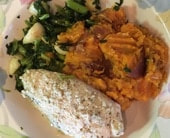 For thousands of years, herbs have been widely used to help relieve symptoms of many different ailments. So after trying different herbs to help alleviate my own anxiety, I had noticed something. All these "natural herbs" can have side affects. So, just as your favorite medicine may carry a list of side affects, herbs may have them as well. Since I have developed a sensitive digestive system over the years, I have become quite hesitant with herbs. But I have found two specific herbs, for tea, that have helped calm some of the annoying symptoms that can go along with anxiety. They are: #1 CHAMOMILE TEA – Chamomile Tea holds a strong number one spot for me, since it contains a relaxant that soothes and calms the body. It has proven to not only calm the nerves, but can calm the lining of the stomach as well. (This is especially helpful for those with “belly anxiety”.) I love to periodically have a nice cup of tea a couple of hours before bed to relax. (Precaution: if you take blood thinners, please speak to your doctor before consuming this tea, since it can thin the blood if you consume too much. Side affects may be nausea and vomiting, but only with high concentrations. Chamomile tea is also a diuretic, so you may find your way to the bathroom overnight. When I drink this tea, I'm always sure to consume it a couple hours before bed, to avoid having to get up later.) #2 PEPPERMINT TEA- Peppermint tea is a staple in my house. It is soothing to the belly, especially after a large meal. It can help aide in digestion, reduce belly aches, and is supportive for irritable bowel sufferers. My anxiety sometimes would start in my belly, therefore, relaxing the belly has helped keep the more severe anxiety at bay...and a happy belly is a happy body! (Precaution: for those with acid reflux, this tea may relax the valve by the stomach which may increase acid reflux. It may also interact with some medications, so it is advised to check with your doctor first before consuming this tea, especially if you are pregnant.) Take note that I only ingest a single ingredient tea, as I have personally found a side affect or two with the multi-ingredient teas. I have also found hidden caffeine in a few. You will want to read the label as "no caffeine", and be leary of words such as "naturally decaffeinated" in the multi-ingredient teas, since it's a nice of saying "there is still a little caffeine in here". Green tea, for example, although very healthy for the body, may contain caffeine even as decaffeinated. Mixing the herbs together may seem like a good idea, but it can also be confusing if you react to something, since you can’t be sure which ingredient was responsible. Ergo, finding one ingredient that works for you, may be the easiest way to go. I have stuck to buying only one ingredient Organic Chamomile tea, and Organic Peppermint tea. These teas have worked very well for me, and depending on my need for the day, I'll choose accordingly. If I’m having more belly issues, I choose the Peppermint, and if I’m looking for more overall calm, I choose the Chamomile. OTHER TEAS TO CONSIDER Now just because I have sensitivities to other teas, doesn’t mean you will. And just because I don't have an issue with Chamomile or Peppermint, doesn't mean you won't. Remember that we are all different! Here are a couple of other teas you may want to consider. -Rooibis tea (for insomnia, reducing anxiety, indigestion aide) This is another tea you may want to consider. For me, since I have a sensitive belly, this tea wasn’t great for me, but I understand that it can help with insomnia, as it has a sedative affect. The problem is that it also may cause stomach upset, and for that alone, I don’t use it. It has been known to help reduce anxiety, promote sleep, and aide with indigestion. (Of course, I can get any and all affects with my two favorites, with no worry.) This herbal tea also has a history of helping with headaches, insomnia, and hypertension. Rooibis is typically found in combination teas, (more than one ingredient), which doesn't appeal to me personally. Just please talk to your doctor before consuming this tea, especially if you have any liver or kidney issues, since it has been linked to liver and kidney toxicity. It also can show estrogen like activity. Those undergoing cancer treatments or have a hormone related cancer, like breast cancer, need to speak to their doctor before consuming, as it can also interact with certain medications. -Passionflower Tea (for anxiety, insomnia) Due to its ability to help reduce anxiety symptoms and insomnia, it remains on the list of teas to try. Side affects that have been seen are: dizziness, nausea and involuntary muscle contractions. Please speak to your doctor before consuming this tea if you are taking blood thinners, drink alcohol, or are on blood pressure medication as it may interact. Due to the possible muscle contracting affect, it is also advised that pregnant women should stay clear, even if you are breastfeeding. -Lemon Balm Tea (anxiety, insomnia, indigestion) As with the above, Lemon Balm can have a sedative affect to help calm the body. The side affects of Lemon Balm may be: nausea, vomiting, abdominal pain, and dizziness. The good news about Lemon Balm is that it doesn’t seem to interact with medications as Passionflower and Rooibis may. It also can be found as a “one ingredient tea”. So, if you find this herb agrees with you, it can be another good choice. Just note that it is always a good idea to check with your doctor first, especially if you are pregnant. Just remember to continue to do your own research. These teas are not a replacement for any other methods you are currently using for anxiety. They are certainly not a cure, and can only be helpful in relieving some of the additional annoying symptoms that can be related with your anxiety. It's always helpful to have an additional tool, which is what these are...just another tool. Be sure if you have any medical issues or concerns that you check with your doctor before heading head first into herbs. Don't let the words "but its a natural plant" get in your mindset, since some of the most natural plants can be harmful to our bodies. Start with small doses. As you steep the tea, just don't let it steep for very long at first, and see how you feel. You can gradually make the tea stronger if you don't notice any side affects, and then enjoy... With love and calm... XO
0 Comments
 There are many foods listed on the internet that have their merit for being good anxiety relievers. After doing my own research with my own anxiety, I have created a list that has worked the best for me. (..and what’s best for me may not be best for you, so be sure to try do your own research!) So, why are certain foods better for relieving anxiety than others? Foods that release serotonin- Some foods contain the building blocks of mood enhancing amino acids. When these cross the blood-brain barrier, neurotransmitters, like serotonin, are released into the body, resulting in a calmer you. Most serotonin is found in the digestive system to aide in digestion. The rest, however, is found in the neurons of the central nervous system, which allows the serotonin to help regulate mood, sleep, and appetite. So what are these amino acids, and which foods contain them?
So, which carbs are the best to release insulin for tryptophan success? Complex Carbohydrates- For better overall health, choosing the slower releasing carbs, complex carbohydrates, are the best way to go. Foods such as oats, brown rice, lentils, beans, and sweet potatoes allows for less of a sugar spike, which should result in a longer lasting effect of the serotonin once released in the body. What is Cortisol and how does it affect your body- Cortisol is a steroid hormone called a glucocorticoid, which is produced in the adrenal glands, found on top of each kidney. It is released during times such as stress, exercise, and when there is a “danger” afoot. When there are high levels of cortisol in the body, and the brain thinks there is a “danger”, it can link up with epinephrine to release the “fight or flight” mechanism. This allows for a sudden burst of energy, or “panic mode” to help a person if they needed to run away faster, or to provide an increase of strength. With those who suffer anxiety and panic attacks, the brain can be fooled to think there is a “danger”, based on fear, and the body kicks in this burst of energy. The brain thinks it is helping the body, but, for those of us who have experienced this, it is far from a good feeling. Can foods help combat high levels of Cortisol? Absolutely! Prolonged increase of cortisol levels can result in not only anxiety, but adrenal fatigue as well. You can help combat this by increasing your vitamin C, zinc, folic acid, and omega-3's. (spinach, kale, broccoli, citrus fruits, salmon, walnuts, wheat germ, beans and barley.) Nutrients you may be deficient in- Let’s face it. Stress can drain your body of important nutrients, and we can end up becoming deficient in some, therefore, enhancing anxiety. Here are some of the key nutrients we should try to keep in our daily diet to avoid worsening anxiety. -B-vitamins (green leafy vegetables) -Calcium (dairy, kale) -Vitamin C (citrus fruits, kale, broccoli) -Magnesium (dark leafy greens, nuts, fish, beans) -Tryptophan (turkey, milk, asparagus) -Vitamin D (dairy, sun exposure) -Folic Acid (wheat germ, lentils, dark green vegetables, citrus fruits) If you notice with the above list, increasing the amount of green leafy vegetables, like spinach and kale, citrus fruits and dairy should help increase the nutrients you may be lacking. Help replenish your body with healthy whole foods, and try to stay away from processed foods, since the additives and preservatives can further keep the body down. Stay healthy and get healthier from the inside out. (Stay tuned for some upcoming healthy stress and anxiety reducing meal ideas!!) Love and peace.. XO |
Michelle FalcoMichelle has a BS, E-RYT, YACEP, CHN, CLYL, and Y12SRL. Archives
September 2017
Categories
All
|



 RSS Feed
RSS Feed